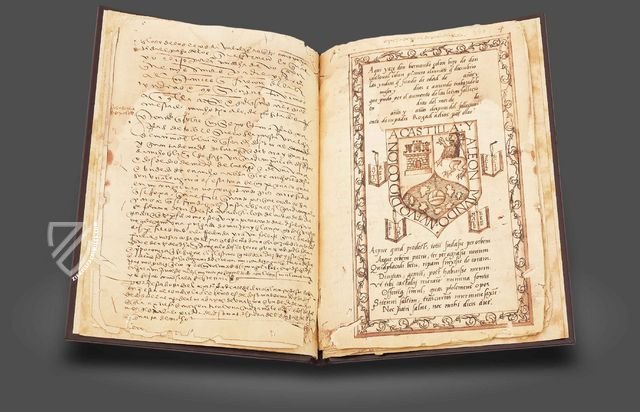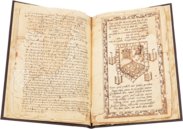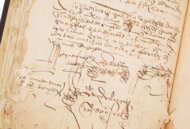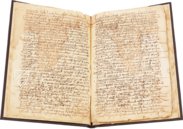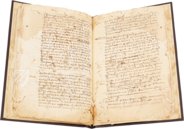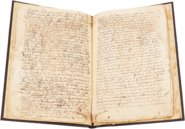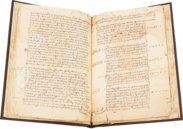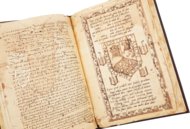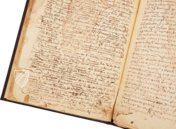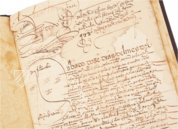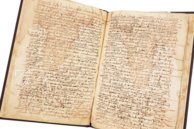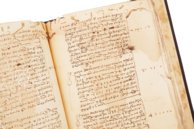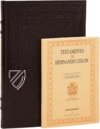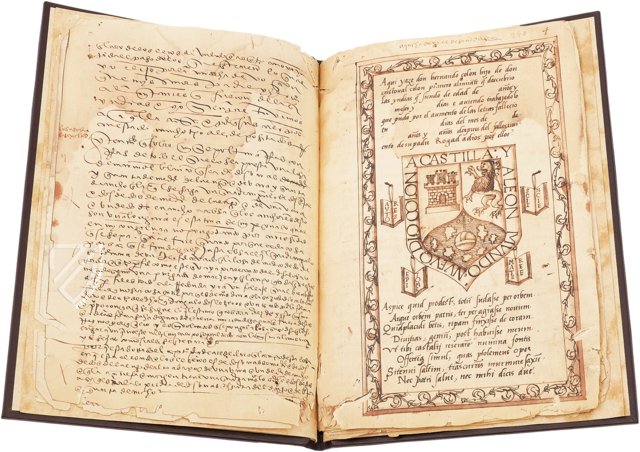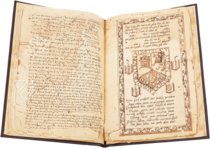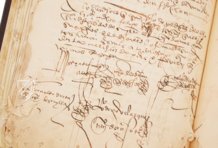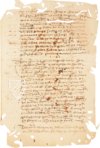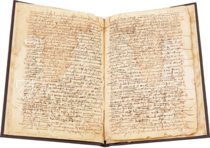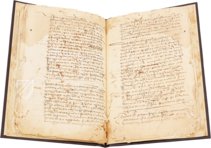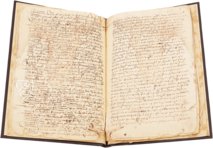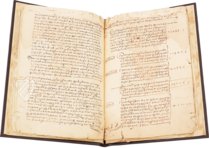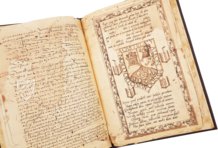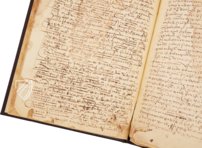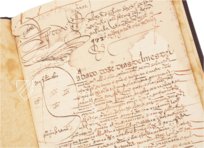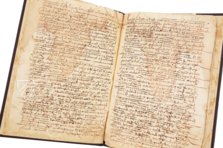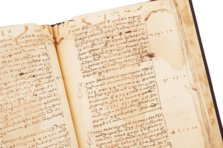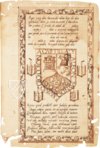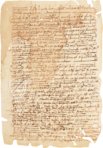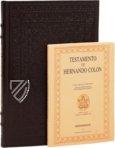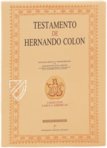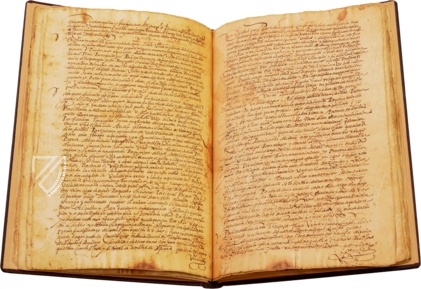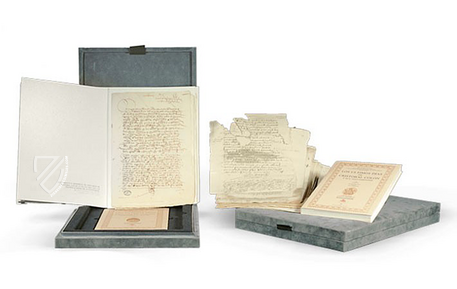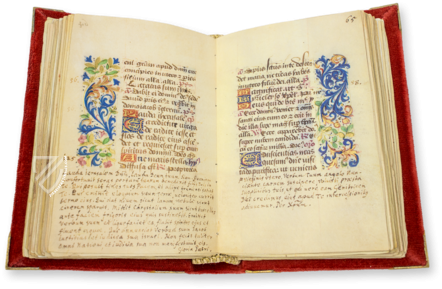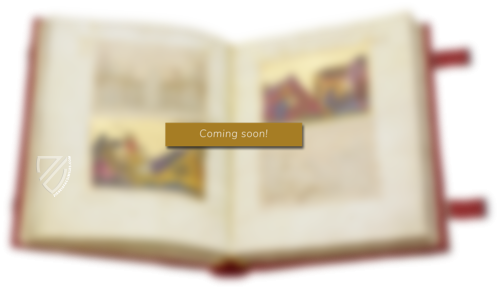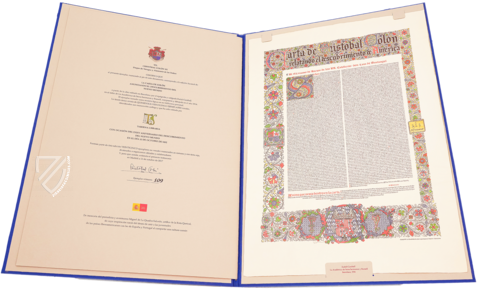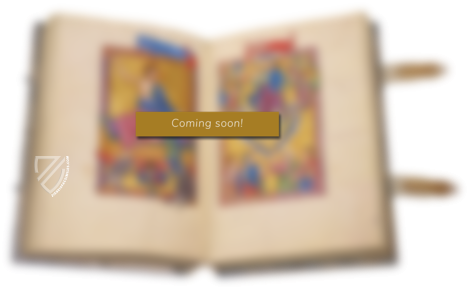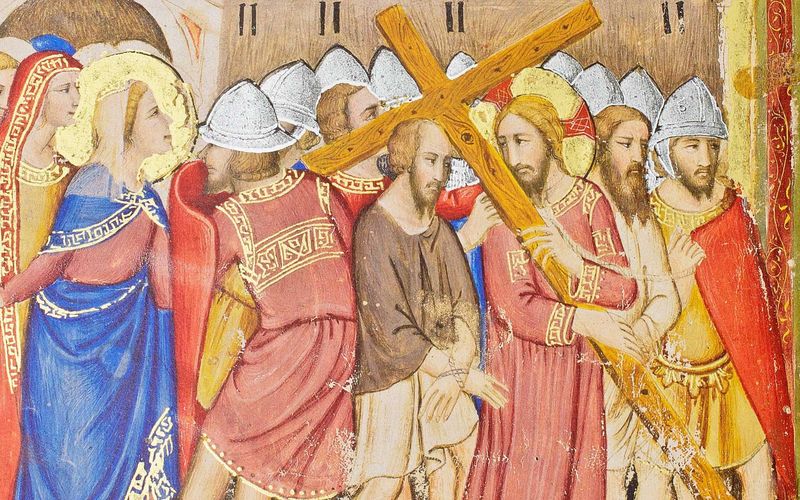Testament of Ferdinand Columbus
(1,000€ - 3,000€)
Ferdinand Columbus, the second, illegitimate son of Christopher Columbus, is not only known because of his famous and historically significant father. He was himself one of the greatest and most critical librarians and book collectors of the 16th century. As the son of the great discoverer of the New World, Ferdinand Columbus enjoyed a comprehensive education at the royal Spanish court and as such was a true humanist. This enthusiasm for education and knowledge expressed itself particularly well in his famous library. As a result, he left the majority of his collection to the library in his last will and testament, which carefully regulates the whereabouts and maintenance of the library as a future precaution. The library of Ferdinand Columbus is managed today as the so-called Biblioteca Colombina of the Seville Cathedral. The last will and testament of a true bibliophile!
Testament of Ferdinand Columbus
Ferdinand Columbus, the second, illegitimate son of Christopher Columbus, is not only known because of his famous and historically significant father. He was himself one of the greatest and most critical librarians and book collectors of the 16th century. As the son of the great discoverer of the New World, Ferdinand Columbus enjoyed a comprehensive education at the royal Spanish court and as such was a true humanist. This enthusiasm for education and knowledge expressed itself particularly well in his famous library. As a result, he left the majority of his collection to the library in his last will and testament, which carefully regulates the whereabouts and maintenance of the library as a future precaution. The library of Ferdinand Columbus is managed today as the so-called Biblioteca Colombina of the Seville Cathedral. The last will and testament of a true bibliophile!
A Historical Personality
Ferdinand Columbus (1488 to 1539) was the second son of Christopher Columbus. He was the result of an illegitimate coupling between Christopher Columbus and Beatriz Enríquez de Arana, his lover and companion in Córdoba. The important explorer was in a very close relationship with Beatriz, which nevertheless manifested itself in a marriage. Ferdinand, called Hernán Colón in Spanish, was a page as a child at the court of the Catholic Monarchs. Together with his half-brother Diego, Columbus’ first born son, he benefitted from a comprehensive education. Thus he enjoyed public legitimation in spite of the stigma of his illegitimate birth. He accompanied his father on his fourth expedition and also undertook many voyages to the New World and throughout Europe later on. Under Charles I, he was active as a cosmographer, and completed, among other royal commissions, the creation of a world map. Furthermore, he was measurably involved in the negotiations over the Treaty of Tordesillas, which sought to resolve territorial disputes in the New World between Portugal and Spain.
The Famous Biblioteca Columbina
His chief occupation and his greatest love was nevertheless his collection of books. Ferdinand founded one of the most important libraries of his time: his collection was comprised of 15,000 books. This comprehensive collection was assembled by the humanist-trained collector from many sources. At times dealing with gifts from important contemporary intellectual giants. As one of the first collectors, Ferdinand Columbus recognized the future importance of incunabula. The collection was managed by Ferdinand Columbus in a very scientific and professional manner. He hired several librarians inter alia, who took care of the collection.
The Last Will and Testament of a Book Lover
Ferdinand Columbus already made arrangements for his beloved and famous library before his death on July 12, 1539. In his will, he decreed that his library should continue and be expanded. The will can be seen in two pieces: the first is a classic will and testament, with notes concerning the desired grave and the conduct of the funeral, directed at his family and servants. The second part on the other hand concerns itself solely and exclusively with the future retention and continuation of the grandiose and famous library of Ferdinand Columbus.
A Significant Gem: Testament and Collection
The books were Ferdinand’s sole and greatest concern as well as his greatest treasures and most important property. In his last will and testament, he specifies that the inheritance of the books is only for the sake of safekeeping. The financial inheritance should solely and exclusively be used for the acquisition of new books and for the expansion of the library, its administration and safe-keeping. This condition was to be reviewed by an inspector appointed by one of the custodians of the collection. Furthermore, Ferdinand gives exact stipulations for the ordering and storage of the books and gives detailed provisions for the future acquisition of new books. Finally, a certain Juan Pérez was named librarian, who was to work in the collection every day for 5 hours for a salary of 60 Ducats. These exact and comprehensive instructions allow the great love of Ferdinand Columbus for his books to be vividly comprehended and are still an impressive testimony of the 16th century.
Codicology
- Alternative Titles
- Ferdinand Columbus Last Will
Testament des Ferdinand Columbus
Testamento de Hernando Colón - Type
- Manuscript
- Size / Format
- 50 pages / 32.8 × 23.0 cm
- Origin
- Spain
- Date
- 1539
- Epochs
- Style
- Artist / School
- Ferdinand Columbus (1488–1539), second son of Christopher Columbus (author)
#1 Testamento de Hernando Colón
Language: Spanish
(1,000€ - 3,000€)
- Treatises / Secular Books
- Apocalypses / Beatus
- Astronomy / Astrology
- Bestiaries
- Bibles / Gospels
- Chronicles / History / Law
- Geography / Maps
- Saints' Lives
- Islam / Oriental
- Judaism / Hebrew
- Single Leaf Collections
- Leonardo da Vinci
- Literature / Poetry
- Liturgical Manuscripts
- Medicine / Botany / Alchemy
- Music
- Mythology / Prophecies
- Psalters
- Other Religious Books
- Games / Hunting
- Private Devotion Books
- Other Genres
- Afghanistan
- Armenia
- Austria
- Belgium
- Belize
- Bosnia and Herzegovina
- China
- Colombia
- Costa Rica
- Croatia
- Cyprus
- Czech Republic
- Denmark
- Egypt
- El Salvador
- Ethiopia
- France
- Germany
- Greece
- Guatemala
- Honduras
- Hungary
- India
- Iran
- Iraq
- Israel
- Italy
- Japan
- Jordan
- Kazakhstan
- Kyrgyzstan
- Lebanon
- Liechtenstein
- Luxembourg
- Mexico
- Morocco
- Netherlands
- Palestine
- Panama
- Peru
- Poland
- Portugal
- Romania
- Russia
- Serbia
- Spain
- Sri Lanka
- Sweden
- Switzerland
- Syria
- Tajikistan
- Turkey
- Turkmenistan
- Ukraine
- United Kingdom
- United States
- Uzbekistan
- Vatican City
- A. Oosthoek, van Holkema & Warendorf
- Aboca Museum
- Ajuntament de Valencia
- Akademie Verlag
- Akademische Druck- u. Verlagsanstalt (ADEVA)
- Aldo Ausilio Editore - Bottega d’Erasmo
- Alecto Historical Editions
- Alkuin Verlag
- Almqvist & Wiksell
- Amilcare Pizzi
- Andreas & Andreas Verlagsbuchhandlung
- Archa 90
- Archiv Verlag
- Archivi Edizioni
- Arnold Verlag
- ARS
- Ars Magna
- Art Market
- ArtCodex
- AyN Ediciones
- Azimuth Editions
- Badenia Verlag
- Bärenreiter-Verlag
- Belser Verlag
- Belser Verlag / WK Wertkontor
- Benziger Verlag
- Bernardinum Wydawnictwo
- BiblioGemma
- Biblioteca Apostolica Vaticana (Vaticanstadt, Vaticanstadt)
- Bibliotheca Palatina Faksimile Verlag
- Bibliotheca Rara
- Boydell & Brewer
- Bramante Edizioni
- Bredius Genootschap
- Brepols Publishers
- British Library
- C. Weckesser
- Caixa Catalunya
- Canesi
- CAPSA, Ars Scriptoria
- Caratzas Brothers, Publishers
- Carus Verlag
- Casamassima Libri
- Centrum Cartographie Verlag GmbH
- Chavane Verlag
- Christian Brandstätter Verlag
- Circulo Cientifico
- Club Bibliófilo Versol
- Club du Livre
- CM Editores
- Collegium Graphicum
- Collezione Apocrifa Da Vinci
- Comissão Nacional para as Comemorações dos Descobrimentos Portugueses
- Coron Verlag
- Corvina
- CTHS
- D. S. Brewer
- Damon
- De Agostini/UTET
- De Nederlandsche Boekhandel
- De Schutter
- Deuschle & Stemmle
- Deutscher Verlag für Kunstwissenschaft
- DIAMM
- Dropmore Press
- Droz
- E. Schreiber Graphische Kunstanstalten
- Ediciones Boreal
- Ediciones Grial
- Ediclube
- Edições Inapa
- Edilan
- Editalia
- Edition Deuschle
- Edition Georg Popp
- Edition Leipzig
- Edition Libri Illustri
- Editiones Reales Sitios S. L.
- Éditions de l'Oiseau Lyre
- Editions Medicina Rara
- Editorial Casariego
- Editorial Mintzoa
- Editrice Antenore
- Editrice Velar
- Edizioni Edison
- Egeria, S.L.
- Eikon Editores
- Electa
- Emery Walker Limited
- Enciclopèdia Catalana
- Eos-Verlag
- Ephesus Publishing
- Ernst Battenberg
- Eugrammia Press
- Extraordinary Editions
- Fackelverlag
- Facsimila Art & Edition
- Facsimile Editions Ltd.
- Facsimilia Art & Edition Ebert KG
- Faksimile Verlag
- Feuermann Verlag
- Folger Shakespeare Library
- Franco Cosimo Panini Editore
- Friedrich Wittig Verlag
- Fundación Hullera Vasco-Leonesa
- G. Braziller
- Gabriele Mazzotta Editore
- Gebr. Mann Verlag
- Gesellschaft für graphische Industrie
- Getty Research Institute
- Giovanni Domenico de Rossi
- Giunti Editore
- Graffiti
- Grafica European Center of Fine Arts
- Guido Pressler
- Guillermo Blazquez
- Gustav Kiepenheuer
- H. N. Abrams
- Harrassowitz
- Harvard University Press
- Helikon
- Hendrickson Publishers
- Henning Oppermann
- Herder Verlag
- Hes & De Graaf Publishers
- Hoepli
- Holbein-Verlag
- Houghton Library
- Hugo Schmidt Verlag
- Idion Verlag
- Il Bulino, edizioni d'arte
- ILte
- Imago
- Insel Verlag
- Insel-Verlag Anton Kippenberger
- Instituto de Estudios Altoaragoneses
- Instituto Nacional de Antropología e Historia
- Introligatornia Budnik Jerzy
- Istituto dell'Enciclopedia Italiana - Treccani
- Istituto Ellenico di Studi Bizantini e Postbizantini
- Istituto Geografico De Agostini
- Istituto Poligrafico e Zecca dello Stato
- Italarte Art Establishments
- Jan Thorbecke Verlag
- Johnson Reprint Corporation
- Johnson Reprint Corporation
- Josef Stocker
- Josef Stocker-Schmid
- Jugoslavija
- Karl W. Hiersemann
- Kasper Straube
- Kaydeda Ediciones
- Kindler Verlag / Coron Verlag
- Kodansha International Ltd.
- Konrad Kölbl Verlag
- Kurt Wolff Verlag
- La Liberia dello Stato
- La Linea Editrice
- La Meta Editore
- Lambert Schneider
- Landeskreditbank Baden-Württemberg
- Leo S. Olschki
- Les Incunables
- Liber Artis
- Library of Congress
- Libreria Musicale Italiana
- Lichtdruck
- Lito Immagine Editore
- Lumen Artis
- Lund Humphries
- M. Moleiro Editor
- Maison des Sciences de l'homme et de la société de Poitiers
- Manuscriptum
- Martinus Nijhoff
- Maruzen-Yushodo Co. Ltd.
- MASA
- Massada Publishers
- McGraw-Hill
- Metropolitan Museum of Art
- Militos
- Millennium Liber
- Müller & Schindler
- Nahar - Stavit
- Nahar and Steimatzky
- National Library of Wales
- Neri Pozza
- Nova Charta
- Oceanum Verlag
- Odeon
- Omnia Arte
- Orbis Mediaevalis
- Orbis Pictus
- Österreichische Staatsdruckerei
- Oxford University Press
- Pageant Books
- Parzellers Buchverlag
- Patrimonio Ediciones
- Pattloch Verlag
- PIAF
- Pieper Verlag
- Plon-Nourrit et cie
- Poligrafiche Bolis
- Presses Universitaires de Strasbourg
- Prestel Verlag
- Princeton University Press
- Prisma Verlag
- Priuli & Verlucca, editori
- Pro Sport Verlag
- Propyläen Verlag
- Pytheas Books
- Quaternio Verlag Luzern
- Reales Sitios
- Recht-Verlag
- Reichert Verlag
- Reichsdruckerei
- Reprint Verlag
- Riehn & Reusch
- Roberto Vattori Editore
- Rosenkilde and Bagger
- Roxburghe Club
- Salerno Editrice
- Saltellus Press
- Sandoz
- Sarajevo Svjetlost
- Schöck ArtPrint Kft.
- Schulsinger Brothers
- Scolar Press
- Scrinium
- Scripta Maneant
- Scriptorium
- Shazar
- Siloé, arte y bibliofilia
- SISMEL - Edizioni del Galluzzo
- Sociedad Mexicana de Antropología
- Société des Bibliophiles & Iconophiles de Belgique
- Soncin Publishing
- Sorli Ediciones
- Stainer and Bell
- Studer
- Styria Verlag
- Sumptibus Pragopress
- Szegedi Tudomànyegyetem
- Taberna Libraria
- Tarshish Books
- Taschen
- Tempus Libri
- Testimonio Compañía Editorial
- TGB Limited Editions
- Thames and Hudson
- The Clear Vue Publishing Partnership Limited
- The Facsimile Codex
- The Folio Society
- The Marquess of Normanby
- The Richard III and Yorkist History Trust
- Tip.Le.Co
- TouchArt
- TREC Publishing House
- TRI Publishing Co.
- Trident Editore
- Tuliba Collection
- Typis Regiae Officinae Polygraphicae
- Union Verlag Berlin
- Universidad de Granada
- Universitaire Bibliotheken Leiden
- University of California Press
- University of Chicago Press
- Urs Graf
- Vallecchi
- Van Wijnen
- VCH, Acta Humaniora
- VDI Verlag
- VEB Deutscher Verlag für Musik
- Verlag Anton Pustet / Andreas Verlag
- Verlag Bibliophile Drucke Josef Stocker
- Verlag der Münchner Drucke
- Verlag für Regionalgeschichte
- Verlag Styria
- Vicent Garcia Editores
- W. Turnowski Ltd.
- W. Turnowsky
- Waanders Printers
- Wiener Mechitharisten-Congregation (Wien, Österreich)
- Wissenschaftliche Buchgesellschaft
- Wissenschaftliche Verlagsgesellschaft
- Wydawnictwo Dolnoslaskie
- Xuntanza Editorial
- Zakład Narodowy
- Zollikofer AG

